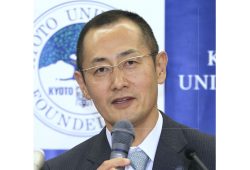
An aerial view of the Fukushima No. 1 nuclear power plant on March 17
2:00 JST, May 18, 2022
About 40% of respondents did not know there is no scientific information that indicates a genetic impact on the descendants of those exposed to radiation in the aftermath of the 2011 disaster at the Fukushima No. 1 nuclear power plant, an Environment Ministry survey has found.
The ministry conducted the first nationwide survey of this kind on issues regarding the nuclear power plant run by Tokyo Electric Power Company Holdings Inc. The ministry is renewing efforts to disseminate accurate information, fearing that misinterpretations of the effects of the disaster might result in prejudice and discrimination directed toward Fukushima Prefecture residents.
Regarding whether being exposed to radiation can cause effects on human genes, research on hibakusha — survivors of atomic bombs on Hiroshima and Nagasaki — has not confirmed any negative results such as an increase of genetic diseases.
The United Nations Scientific Committee on the Effects of Atomic Radiation also last year compiled a report that revealed no genetic effects observed in connection with the accident at the Fukushima nuclear plant.
The ministry conducted the survey last year after dividing the nation into 10 regions, which featured Tokyo and Fukushima Prefecture.
The survey was conducted online on 420 residents in each of the areas for a sum of 4,200.
In response to the possibility that exposure to radiation after the nuclear accident could cause genetic effects on residents in Fukushima Prefecture, 41.2% of those surveyed said the possibility was “high” or “very high.”
A breakdown by percentage shows respondents who said high or very high were mostly in Hokkaido at 49.8%, followed by the Shikoku area at 46.7%, with the figures at 44.1% in Chubu, 42.6% in Kinki and 41.4% in Tokyo.
However, in Fukushima Prefecture, only 26.9% said the possibility was high or very high.
“There is the possibility that misunderstandings could result in discrimination or prejudice at times such as marriage or during pregnancy,” a ministry official said.
The ministry has made efforts to disseminate accurate information by starting a website exclusively focusing on educating the public about radiation, while also organizing events in which university students and others can learn about the effects of exposure.
Top Articles in Society
-

Man Infected with Measles May Have Come in Contact with Many People in Tokyo, Went to Store, Restaurant Around When Symptoms Emerged
-

Australian Woman Dies After Mishap on Ski Lift in Nagano Prefecture
-

Woman with Measles Visited Hospital in Tokyo Multiple Times Before Being Diagnosed with Disease
-

Foreign Snowboarder in Serious Condition After Hanging in Midair from Chairlift in Nagano Prefecture
-

Record-Breaking Snow Cripples Public Transport in Hokkaido; 7,000 People Stay Overnight at New Chitose Airport
JN ACCESS RANKING
-

Japan Institute to Use Domestic Commercial Optical Lattice Clock to Set Japan Standard Time
-

Israeli Ambassador to Japan Speaks about Japan’s Role in the Reconstruction of Gaza
-

Man Infected with Measles May Have Come in Contact with Many People in Tokyo, Went to Store, Restaurant Around When Symptoms Emerged
-

China Eyes Rare Earth Foothold in Malaysia to Maintain Dominance, Counter Japan, U.S.
-

Prudential Life Insurance Plans to Fully Compensate for Damages Caused by Fraudulent Actions Without Waiting for Third-Party Committee Review



















